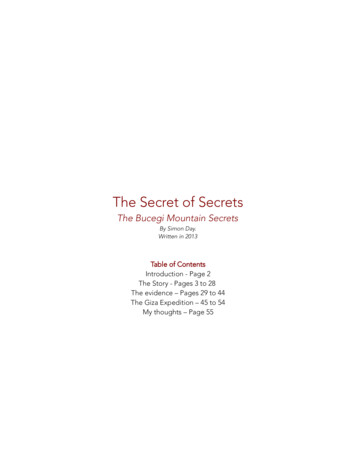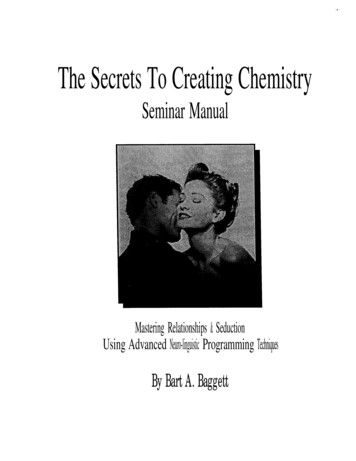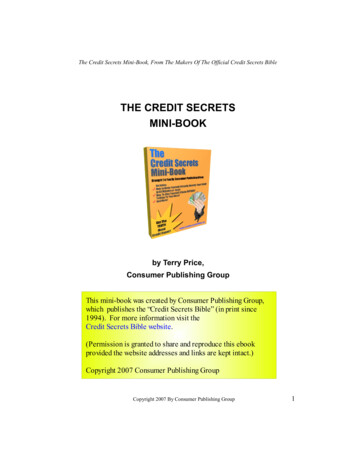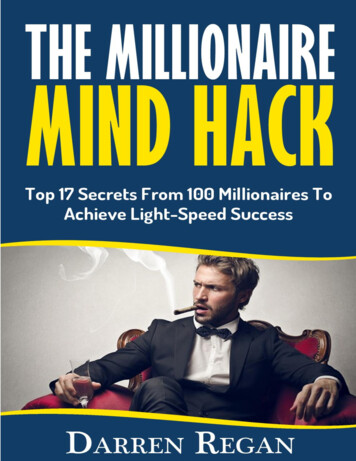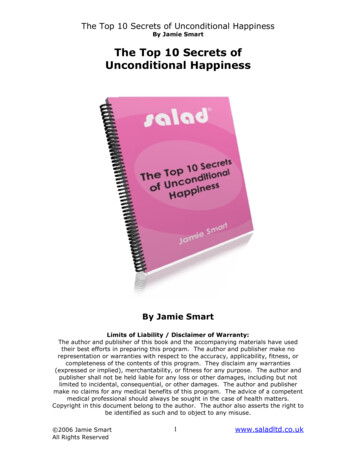
Transcription
The Top 10 Secrets of Unconditional HappinessBy Jamie SmartThe Top 10 Secrets ofUnconditional HappinessBy Jamie SmartLimits of Liability / Disclaimer of Warranty:The author and publisher of this book and the accompanying materials have usedtheir best efforts in preparing this program. The author and publisher make norepresentation or warranties with respect to the accuracy, applicability, fitness, orcompleteness of the contents of this program. They disclaim any warranties(expressed or implied), merchantability, or fitness for any purpose. The author andpublisher shall not be held liable for any loss or other damages, including but notlimited to incidental, consequential, or other damages. The author and publishermake no claims for any medical benefits of this program. The advice of a competentmedical professional should always be sought in the case of health matters.Copyright in this document belong to the author. The author also asserts the right tobe identified as such and to object to any misuse. 2006 Jamie SmartAll Rights Reserved1www.saladltd.co.uk
The Top 10 Secrets of Unconditional HappinessBy Jamie SmartTable of ContentsRead This First.3Who is this e-book for?. 4Introduction. 4What is Unconditional Happiness?. 5Why Choose Unconditional Happiness?.6#1 – What You Focus On Increases. 7#2 – Gratitude Is The Manifestation Turbo-charger. 8#3 – People Like What’s Familiar. 9#4 – What The Thinker Thinks, The Prover Proves. 10#5 – Acceptance Is The WD40 Of Change & Growth. 11#6 – People Want Feelings . 12#7 – Become Willing To Receive .13#8 – Use Power Affirmations. 14#9 – All Is Well; There Is Nothing To Fear. 15#10 – You Are Already Here. 16More Information. 17Free Stuff.19About the Author.20Acknowledgements.20 2006 Jamie SmartAll Rights Reserved2www.saladltd.co.uk
The Top 10 Secrets of Unconditional HappinessBy Jamie SmartRead This FirstWelcome to The Top 10 Secrets of Unconditional Happiness. My name’s Jamie Smart.I’m an NLP trainer, author, and creator of NLP Coaching CardsTM, the world’s leadingresource for learning NLP coaching language, and I’d like to say “thank-you” to youfor reading this e-book. I’d also like to ask you to please send this e-book to yourfriends and colleagues, because it will help them, it will help me to reach morepeople, and because it will make you feel good too! If you’ve been sent this ebook by someone else, then make sure that you sign up for the FREEUnconditional Happiness newsletter that accompanies it, here:www.saladltd.co.uk/4.htmOnce you do, you will be sent new issues every week to give you tips to help you behappy now. You can read each of these gems of wisdom in less than a minute, butthe lessons you learn will be enriching your life for years to come.This book complements our Art Of Being 8CD set (also available as an MP3download). I’ll be referring to the Art of Being principles in the newsletter, but whenyou buy the CDs and get the principles now, you can unlock the massivepotential this book reveals immediately.These recordings are simply the fastest way there is to develop your ability to behappy now. The insights you’ll be getting from the newsletter complement theconcepts on the CDs, so when you have both, it will really turbo-charge yourlearning. 2006 Jamie SmartAll Rights Reserved3www.saladltd.co.uk
The Top 10 Secrets of Unconditional HappinessBy Jamie SmartWho is this e-book for?This e-book is for people who have run up against the limitations of traditional goalsetting and are looking for something deeper. It is for people who are not willing tosettle for anything less than being 100% true to themselves, and living an authenticlife. Most of all, it is for people who want to be happy, and haven’t found whatthey’re looking for. It will be of particular interest to people who help other peoplefind direction in their lives, including executive coaches, life coaches, therapists,hypnotists, trainers, managers, salespeople, consultants, networkers, students ofNLP, health-workers, doctors and other healers.IntroductionBack in 1996, when I read my first book about personal development, I had no ideaof how my life would unfold. I was living in Oxfordshire, working as a projectmanager for a publishing company, and was making a decent living to supportmyself and my wife (we’d just married).Slowly, I began to apply the principles I’d learned. Some things changed naturally inmy life (I got a job working for a consultancy and moved to London), and I began tosee the results of my efforts.I was becoming more willing to engage with the adventure of my life. Let me explain.When I was working for the publishing company in the early 1990s: I was good at my job, and well-paid for it, but I didn’t feel fulfilled. I had a sense that there was something else I was supposed to be doing on thisplanet, but I had no idea what it was. To make matters worse, I didn’t actually believe that I could do anything else I could see how other people could follow their dreams, change jobs, start businesses, change tracks, find new careers, become entrepreneurs, but I somehowknew I couldn’t. I didn’t have a clear direction for my life, but I wanted one.In 1998, I attended my first personal development training (a 2-day introduction toNLP). Two weeks later, I quit my job and set up my own business (still working as aconsultant). I still didn’t know what I wanted to do, but I knew that personaldevelopment had something to do with it.In the years that followed, I spent most of my time off (and a lot of my income) onfinding the finest personal development trainers, and learning everything I couldfrom them. I moved out of project management and into much more people-orientedwork, and with each move, my overall sense of peace and fulfillment increased. 2006 Jamie SmartAll Rights Reserved4www.saladltd.co.uk
The Top 10 Secrets of Unconditional HappinessBy Jamie SmartBut I discovered something very strange.I could get great results helping other people make changes and get what theywanted, but I had limited success using formal techniques to do work on myself. Ifelt like a page had been left out of the manual.While I knew I was moving in the right direction, I still didn’t have the sort of peace,joy and happiness in my life that I knew was possible.My frustration with this situation sent me outside of the field of NLP and hypnosis, toareas as diverse as homeopathy, quantum physics, provocative therapy, TFT,spirituality, yoga my search was extensive. And in the course of that search, Idiscovered some keys.This e-book contains some of the most powerful of those keys. As you read this,you'll start to see the areas where these patterns apply in your own life. Read on,and later I'll show you a way you can accelerate your ability to put these patterns towork for you.What is Unconditional Happiness?We live in a society that propagates the myth of “I’ll be happy when ”. I’ll be happywhen I get the car, the house, the partner, when they change. This is a lie, and moreand more people are discovering that fact.Happiness is your birthright. It’s not just for the few, for the worthy, for the“righteous”. It is for all of us, like the air that we breathe.Stop for a moment. Feel the air going in and out of your lungs. We take the air forgranted, and so we should. It does not have to be deserved, earned or worked for. Itis yours. No further qualification is necessary. You are entitled to it.It’s the same with happiness. You may, however, have been conditioned intothinking that happiness is conditional (“I’ll be happy when I get x, y or z”). Staytuned to discover how you can let go of that conditioning!What would happen if you suddenly began to realise that happiness is yourbirthright? What would happen if you could experience happiness independent of theexternal conditions of your life?This is unconditional happiness. 2006 Jamie SmartAll Rights Reserved5www.saladltd.co.uk
The Top 10 Secrets of Unconditional HappinessBy Jamie SmartWhy Choose Unconditional Happiness?You may think it an odd question to ask – you may think it should be obvious, but I’llanswer it anyway. Here are some of the reasons to be happy now: You’ll feel happy, and that’s really really good! (I know it seems obvious, but Ithought I’d mention it anyway). You’ll begin to spend more & more time in the present moment, and less timeworrying about the future and the past. Your direction and purpose in life will become clearer and clearer (they won’t arrive like a telegram, but will emerge as you begin to relax and let go). You will suddenly be able to make sense of the results you’ve been getting inyour life, and make simple changes to start living the life you desire. You’ll start to let go of worry & start enjoying yourself. (You may even begin tothink about the future with a sense of excitement, anticipation, and enjoyment ofthe life you already have). In all likelihood, you’ll experience more of the “success” you may have beenseeking for a long time. Happy people attract more of the things, situations andexperiences which give them happiness. Sort out your happiness first, and thematerial things you desire are much more likely to show up. You will become more and more true to yourself, and start living an authenticlife. 2006 Jamie SmartAll Rights Reserved6www.saladltd.co.uk
The Top 10 Secrets of Unconditional HappinessBy Jamie SmartUnconditional Happiness Tip#1 – What You Focus On IncreasesWhat you focus on increases. I’m sure you already know this, but it bears repeating.Whatever you focus your attention on over time will increase in your experience.What do I mean by focus? The combination of thought and emotion. Wherever youput your attention, results will follow.A simple example of this is money: If you spend your time worrying about bills, overdrafts & lack of money, youwill start (or continue) experiencing lack of money. If you spend your time being focusing on (& being grateful for) the moneyyou have, you will start (or continue) experiencing an abundance of money.NB. This is not an invitation to be an ostrich. By all means, pay your bills & deal withany money issues that arise; just stop worrying about it.The power of focus can work in every area of your life. When you combine focuswith gratitude you create an amplifier for your experience. You get what you focuson. Whatever you focus on, you will experience more of.If you are unsure of what you are focusing on, just notice what results you aregetting in your life. The results you’ve got (& the experiences you are having) are afool-proof indicator of what you’ve been focusing on - no exceptions. Challenge: Review your results & identify what you’ve been focusing on.Then decide what you’d like to change. Whenever you catch yourself focusingon what you no longer choose, switch your focus to what you now choose. 2006 Jamie SmartAll Rights Reserved7www.saladltd.co.uk
The Top 10 Secrets of Unconditional HappinessBy Jamie SmartUnconditional Happiness Tip#2 – Gratitude Is The Manifestation Turbo-chargerGratitude is the manifestation turbocharger. If you want more of something in yourlife, be grateful for what you already have. As what you have increases, you canallow yourself to become even more grateful. Now, you can be grateful to whateveryou like: UniverseGodBuddhaAllahAll That IsUniversal love A Higher PowerThe Natural WorldEnergyNatureWholenessNatural law Your UnconsciousA Guardian AngelQuantum FieldSpiritAll of the aboveAnything elseYou can be grateful to any or all of these, as well as anything else you can think of.Remember, what the thinker thinks, the prover proves (see Tip #4), so you canmake up something to be grateful to that has all the qualities & attributes you wouldlike in a ‘deity’. *Gratitude is one of the most powerful ways to focus your energy. The pattern ofgratitude in your consciousness gets you into receiving mode, & receive you will.Stuff you can feel grateful for: MoneyLoveAwarenessFriendsLoved ones BooksFunKnowledgeFamilyYour home Inner peaceFeelingsHealthHaving a noseAnything elseRemember, what you focus on increases (see Tip #1): if you only have 5, begrateful for that & you’ll get more. If you haven’t been in love since you were 10, begrateful for the love you had then; you’ll get more. If you only have presentmoment awareness for 30 seconds a month, be grateful for that 30 seconds, & morewill be on its way.*(If this upsets you because your G-d is the One True G-d, worry not; you areof course, correct. The above section is only for those poor folk who don’tknow about the One True G-d ) 2006 Jamie SmartAll Rights Reserved8www.saladltd.co.uk
The Top 10 Secrets of Unconditional HappinessBy Jamie SmartUnconditional Happiness Tip#3 – People Like What’s FamiliarVirginia Satir famously said that the most powerful force in human beings isfamiliarity; we have a natural resistance to radical change.Think about it: if your body temperature suddenly increased by 20 degrees, or theacidity of your blood dropped by a few ph, you would die instantly. Your body-mindhas a set of controls & balances that help keep you in a state of equilibrium. Thisequilibrium is called ‘homeostasis’.When we encounter change, the ‘familiarity sensors’ in & around our nervous systemstarts sending ‘alert’ messages to the brain. The system then begins to take actionto return it to a stable state.The thermostat on a central heating system may serve as a good example. You setthe thermostat to 70 degrees Fahrenheit. The heating system then checks itsthermometer to read the current temperature. If it is less than 70, the heatingsystem is activated; once the temperature reaches 70, the heating is turned off.The central heating thermostat is an example of a single cybernetic loop. Thehuman nervous system consists of thousands of such loops, constantly sensing theinternal & external environment, & making small adjustments to ensure that thefamiliar stable state is maintained.Most people have had the experience of making a change they really like, thenbacksliding to the old behaviour or situation. The familiarity principle provides oneexplanation for this sometimes baffling phenomenon.When you’ve been doing something new for a while (whether it’s going to the gym,tidying your desk or changing your thinking) its typically smooth sailing until youstart to change. Then your nervous system sets off the alarm bells, and you start tofeel like you can’t be bothered to do it anymore. This is the signal that it’s working!When you feel that ‘can’t be bothered’ feeling, pat yourself on the back! What you’redoing is working, and you’ve got evidence. Then do it! People like what’s familiar. 2006 Jamie SmartAll Rights Reserved9www.saladltd.co.uk
The Top 10 Secrets of Unconditional HappinessBy Jamie SmartUnconditional Happiness Tip#4 – What The Thinker Thinks, The Prover ProvesIn Robert Anton Wilson’s excellent book Prometheus Rising, he models the mind ashaving two main parts; a thinker and a prover. The thinker is extremely flexible, andcan think any number of things. The thinker can think the earth is flat; the thinkercan think the earth is spherical. It can think all men are poison; it can think all menare essentially good. The thinker can think that women are intuitive and men arerational; it can think the opposite. It can think that there isn’t enough to go round;it can think we live in a world of unlimited abundance. The thinker can think prettymuch anything. The prover is much more predictable: what the thinker thinks, theprover proves (WTTTTPP).Whatever the thinker is thinking, the prover will sort for evidence to support it. If aperson thinks that all homeless people are lazy, the prover will sort through theirexperience to find evidence to support that idea. If they think all homeless peopleare victims, the prover will find evidence to support that idea. If a person considersthemselves to be stupid, the prover will find evidence to show that it’s ‘true’. If aperson thinks they are brilliant, the prover will show that to be true. What thethinker thinks, the prover proves. While it’s easy to see that this is the case foreveryone else, it’s not always so easy to recognise that it’s also the case for us.While it’s easy to identify the ways in which someone else is limiting themselves, thethings we believe are ‘really true’ – aren’t they?WTTTTPP is a simple way of understanding how beliefs operate in the human nervoussystem. Beliefs are very powerful, helping us to get a sense of certainty anddirection in an unpredictable world.They are so powerful, in fact, that wesometimes don’t remember that they’re not necessarily ‘true’. Tip: If you want to change your beliefs, first identify the limiting belief (Eg. Ican’t relax), then craft a new counter-belief that supports you (Eg. I can learnto relax easily). Become willing to let go of the old belief, then state the newbelief, paying attention to the sensations in your body. Accept any sensationsof resistance, then repeat. Repeat the process until you can state the newbelief congruently. 2006 Jamie SmartAll Rights Reserved10www.saladltd.co.uk
The Top 10 Secrets of Unconditional HappinessBy Jamie SmartUnconditional Happiness Tip#5 – Acceptance Is The WD40 Of Change & GrowthAcceptance is the WD40 of growth, development & results. Accepting a situation isnot the same as saying you like it, are happy with it, or are even willing to put upwith it. Acceptance merely means that you recognize the reality of the currentsituation. Acceptance is particularly useful when applied to: People (including yourself & others)FeelingsThingsSituationsProblemsResults that you wantAnything that is causing you pain, unrest or discomfortYou can, if you choose, believe that everything is perfect in this moment. Thatdoesn’t mean that things can’t be changed, improved, altered or in some waybettered. It merely means that right now, in this moment, things are the way theyare.Some people use the headline of ‘positive thinking’ to deny the reality of the currentsituation. This makes matters worse. Acceptance is the opposite of denial.Acceptance is a way of ‘meeting yourself at your own map of the world’ and gettingdeep rapport between your conscious and unconscious minds.Paradoxically, when you accept things as they are in this moment (includingyourself), you put yourself in the most powerful position to create change. Tip: If you are finding something particularly difficult to accept, accept that.If you get captured by strong emotions, accept that. Accept yourself exactlyas you are. 2006 Jamie SmartAll Rights Reserved11www.saladltd.co.uk
The Top 10 Secrets of Unconditional HappinessBy Jamie SmartUnconditional Happiness Tip#6 – People Want FeelingsPeople want feelings, and they already have them.People think they desire things and experiences, but what they actually want is thefeelings those things will get them.Here’s how you can find out what you really want. Choose anything you desire (thiscan be a thing, an experience, a change to yourself or your circumstances), then askyourself “What would that give me that I wouldn’t otherwise have?” Then take theanswer and ask the question again, about that. Ask it several times, and find outwhat happens.For example:Q: What do you want?A: To have my own business.Q: What would that give you that you wouldn’t otherwise have?A: I would be free to do what I want to do.Q: And what would that give you that you wouldn’t otherwise have?A: The sense that I am being true to myself.Q: And what would that give you that you wouldn’t otherwise have?A: PeaceWhen you ask the question several times, you’ll often end up at a feeling (oftensomething like freedom, security, peace or love). You may even feel the feeling whileyou do this exercise!The feeling is what you really want. Having said that, I’m all in favour of materialstuff too – stacks of folding currency, foreign holidays, happy relationships anddelicious meals. I just don’t think my happiness / peace / fulfillment is dependant onthem any more.Ironically, the more you feel the feelings now that the things you want will give you,the more quickly and easily those things will start showing up in your life! People likewhat’s familiar, so get familiar with the feelings you’ll feel when the things andcircumstances you desire show up in your life. 2006 Jamie SmartAll Rights Reserved12www.saladltd.co.uk
The Top 10 Secrets of Unconditional HappinessBy Jamie SmartUnconditional Happiness Tip#7 – Become Willing To ReceiveYou deserve great things, so become willing to receive.I’ve met many people who are working hard to get what they want, yet it is veryclear that on some level they aren’t willing to receive it. From the tangibles (likemoney, relationships, and foreign holidays) to the intangibles (like joy, peace ofmind and inner fulfillment) you won’t experience them until you’re willing to.So how do I know you deserve great things? Great question.Life is an amazing thing. When you stop for a moment and think about it, despite allthe pain and sorrow it can entail, life is awesome. You were deserving enough of lifeto be given that, so anything you might want while you’re here is a mere trifle incomparison.I often do an exercise on training courses where I’ll give a 50 note to someone whoI think is unwilling to receive. Sure enough, without fail, they will not take this gift,given unconditionally.The universe gives you all that it gives you without condition (your life, your breath,the gravity that holds you to the earth). In fact, you could even take the view thatthe universe has been throwing good stuff at you your whole life, and the only thingthat’s stopped you from having it is that you’ve been unwilling to receive it.Tell yourself “I am willing to receive all the good that comes to me”, then accept anythoughts and feelings which arise.One of the things that many people are unwilling to receive is happiness. They spendtheir lives in the pursuit of it, but do whatever they can to avoid it at the last minute.When I first heard this, I thought it was ridiculous, but I started to find evidence thatit was true for me. So I said to myself “You have to decide that you’re willing to behappy now.”Say “I am willing to be happy now.” then accept any thoughts and feelings whicharise. Do this on a daily basis, until you don’t need to do it anymore.You deserve great things, so become willing to receive. 2006 Jamie SmartAll Rights Reserved13www.saladltd.co.uk
The Top 10 Secrets of Unconditional HappinessBy Jamie SmartUnconditional Happiness Tip#8 – Use Power AffirmationsA presupposition in language can be described as ‘what must be true for thesentence to make sense’.For instance, in the sentence “I like bees”, it ispresupposed that: I exist. Bees exist. Liking is possible.So far so good. Now, one of the most well-known NLP questions is “What do youwant?” This presupposes the following:You exist.Wanting is possible.lack or otherwise do not have.There exists some ‘thing’ (the ‘what’) that youAs a tool for helping to focus a person’s mind, this question is excellent, BUT assoon as a person sets out to answer it, they accept the presupposition that there issomething missing. When this idea is combined with “What the thinker thinks, theprover proves” the brain’s predilection for the familiar, the following issues arise:Statement of Intent“I want to be happy”“I’m trying to lose weight”“I’m searching for the answer”“I choose peace”“I’m grateful for what I have”“I am fabulously wealthy”“I am happy”What You Get to ExperienceWanting Trying Searching Choosing Being grateful Being wealthy Being happy You are the big “I am”. We all become what we think about, and one of the quickestways to increase what’s possible for you is by using “I am”. Want to feel good moreof the time? Be fitter? Richer? Happier? Use the power affirmation “I am”. “I amfabulously wealthy.” “I am joyfully happy.” “I am effortlessly attractive.” Say one ofthese affirmations, notice whatever thoughts or feelings come up, then accept them(for added impact, say them into a mirror or to another person). Remember, there isonly now, and people like what’s familiar. If the “I ams” you’ve been using so fararen’t working out for you (Eg. I am unsuccessful, poor, unlucky) you might like tochange them. If you want to be wealthy, it won’t happen until your neurology getscomfortable with the idea that you’re wealthy. Want to be persistently happy? Thatwill happen when you get comfortable with it (today is practice for tomorrow,remember?). So start getting familiar with it right away – you are the big “I am”,and you always have been! 2006 Jamie SmartAll Rights Reserved14www.saladltd.co.uk
The Top 10 Secrets of Unconditional HappinessBy Jamie SmartUnconditional Happiness Tip#9 – All Is Well; There Is Nothing To FearAll is well; there is nothing to fear. I know this may come as a shock to you, buteverything’s OK. Having said that, it’s still a good idea to wear a seatbelt. But it’sworth reminding yourself that you’ve managed to come through and learn fromeverything that’s ever happened in your life.Fears, worries and anxieties only come when a person imagines unpleasant things inthe past or the future. When you allow yourself to get into the present, thensuddenly you begin to realise that all is well; there is nothing to fear.If you believe in the theory of evolution, the emotional response of fear hasdeveloped over millions of years to give us ‘in the moment’ messages about thingswhich are endangering us. But when it’s combined with the human ability to imaginethe future and the past, it can create problems (Eg. stress and anxiety).Stop for a moment. Focus your attention on your breathing, and allow yourself tonotice the thoughts and feelings moving through your awareness. These thoughtsand feelings are not you; they are just processes occurring in your experience. Anyfeelings you get in response to the thought about the future or the past are justfeelings about thoughts (in the form of memories and plans/fantasties); not aboutreality.Some people say “Nothing to fear – what about death?” but you’re the spearhead ofevolution. Death, is perfectly safe; organisms of one sort or another have been doingit for millions of years You may think this is unrealistic, but consider this. Thefeelings of fear and anxiety if experienced consistently over time (Eg. work-relatedstress) cause serious health issues, and the feelings of happiness and joy lead togood health, which is a more realistic response to life?Furthermore, if what the thinker thinks the prover proves, then believing that all iswell probably leads to significantly less fear and anxiety than the alternative.You might like to try the belief that all is well on for size, and discover what resultsyou get! 2006 Jamie SmartAll Rights Reserved15www.saladltd.co.uk
The Top 10 Secrets of Unconditional HappinessBy Jamie SmartUnconditional Happiness Tip#10 – You Are Already HereYou are already here.The place you thought you’d get to once you’d made the changes, achieved thegoals, completed the journey; you’re already here. In fact, you never left. The onlything that has ever stopped you from experiencing the reality of being here is theidea that you need to be somewhere else.The only thing that is (or can) stop you from experiencing the peace and fulfillmentof now is the idea that peace and fulfillment is elsewhere, in something else, adifferent experience, further on down the road.But it isn’t. You’re here, and you always have been. You’re here, and you always willbe. So you can stop struggling, relax, and feel a sense of comfort in the knowledgethat you are already here.Now you may protest “But I’m not peaceful, happy, fulfilled! I’ve been trying toachieve peace for years and I’m not there yet!”You cannot find something where it isn’t. Stop struggling. Stop searching. Acceptyourself exactly as you are. The search is over. Peace / love / fulfillment / joy; theseare at the core of who you are. When you stop trying to find them elsewhere, whenyou give up the search, you will start to experience them.Here’s the deal in a nutshell: When you are searching for peace, you presuppose thatyou don‘t have it. What the thinker thinks the prover proves, so your neurology sortsand filters all your perceptions to prove that you don’t have it. This becomes moreand more familiar over time, and the search continues. It is a search without an end.Are you willing to give up the search?You are already here. You never left. You only thought you did. You are whole andcomplete. Relax. Let go. Allow yourself to discover who you really are."To grow, you must be willing to let your present and future betotally unlike your past. Your history is not your destiny."Alan Cohen 2006 Jamie SmartAll Rights Reserved16--www.saladltd.co.uk
The Top 10 Secrets of Unconditional HappinessBy Jamie Sm
The Top 10 Secrets of Unconditional Happiness By Jamie Smart Read This First Welcome to The Top 10 Secrets of Unconditional Happiness.My name’s Jamie Smart. I’m an NLP trainer, author, and creator of NLP Coaching CardsTM, the world’s leading resource for learning NLP coaching

